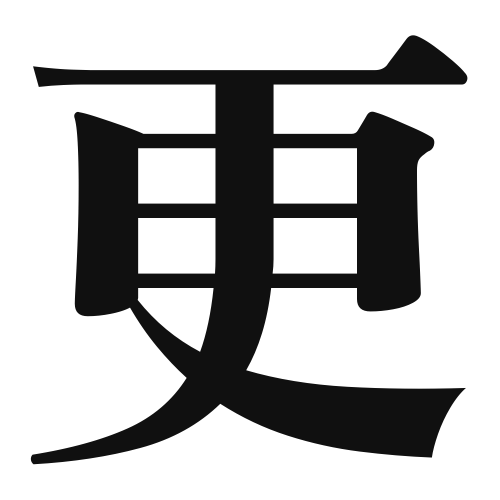1. Overview of Meaning
The kanji “更” (pronounced “sara” or “kou”) generally means “to change,” “to renew,” or “more.” It conveys the idea of transformation or improvement, often used in contexts where something is being updated or enhanced.
2. Formation and Radical
Formation of the Kanji: The kanji “更” is a phonetic-ideographic character (形声文字). It combines the radical for “moon” (月) which can imply time or change, with a phonetic component that suggests its pronunciation.
Radical: The radical for “更” is 月, which is often associated with time and transformation, reflecting the kanji’s meaning of change and renewal.
3. Examples of Usage
Common Words and Phrases:
- 更新 (こうしん, koushin) – update
- 更生 (こうせい, kousei) – rehabilitation
- 更なる (さらなる, saranaru) – further
Example Sentences in Daily Conversation:
- このアプリを更に更新しました。 (Kono apuri o sara ni koushin shimashita.) – I have further updated this app.
- 彼は更生プログラムに参加しています。 (Kare wa kousei puroguramu ni sanka shiteimasu.) – He is participating in a rehabilitation program.
4. Synonyms and Antonyms
Similar Kanji:
- 変 (へん, hen) – change (more general, can imply a transformation that is not necessarily positive)
- 改 (かい, kai) – reform (implies improvement or correction)
Antonyms:
- 不変 (ふへん, fuhen) – unchanging
- 維持 (いじ, iji) – maintenance (to keep the same)
5. Cultural and Historical Background
Relation to Japanese Culture: The concept of change and renewal is significant in Japanese culture, often reflected in traditions such as the New Year celebrations, where people seek to renew their spirits and start fresh.
Proverbs and Idioms:
- 「日々是好日」 (Hibi kore koujitsu) – “Every day is a good day,” which emphasizes the idea of appreciating daily changes and improvements.
- 「変わらぬものはない」 (Kawaranumono wa nai) – “Nothing remains unchanged,” highlighting the inevitability of change.
